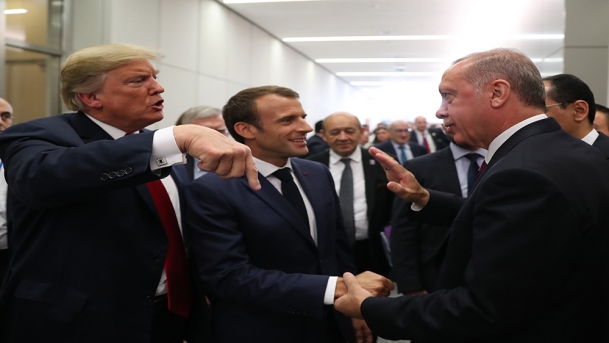
In early August 2018, the US administration imposed sanctions on the Turkish interior and justice ministers, ostensibly for Turkey’s refusal to release Andrew Brunson, an American evangelical pastor detained for his alleged ties with the Gulen movement and the Kurdistan Workers’ Party (PKK). Although the sanctions had little tangible impact, the move was symbolically significant: it was the first time the United States had sanctioned a fellow NATO member since the alliance was formed in 1949. The sanctions deepened and underscored the mounting crisis in US-Turkish relations, raising questions about whether they were headed toward an irrevocable break.
While there is no doubt that US-Turkish ties are at a low point, the truth is that relations between the countries have long been punctuated by crises and tensions, from President Johnson’s refusal to support Turkey in Cyprus in the mid-1960s and a subsequent arms embargo to Turkey’s declining to join US sanctions on Iran in the wake of the hostage crisis in the 1970s and its more recent rejection of the US request for a corridor into Iraq in 2003.
Despite relatively stable Turkish-US ties in the early Obama years, grievances between the two countries have accumulated in recent years. In 2013, Turkey was disappointed by what it saw as the Obama administration’s tepid response to the military coup in Egypt. American support for the Kurdish Democratic Union Party (PYD) in Syria—a branch of the PKK—heightened Turkey’s mistrust and anger at the United States. This compelled Turkey to seek closer relations with Russia and Iran, as it attempted to secure its southern border against both the Islamic State (IS) and Kurdish militias. Although the United States and Turkey reached an agreement on the Kurdish presence in northern Syria west of the Euphrates in July 2018, ongoing American support for the PYD remains a concern for Turkey.
Turkey’s closer ties with Russia are another sore point in relations. For Turkey, its rapprochement with Russia is logical given Washington’s hands-off attitude to Syria, but the United States is concerned that the interest-based Turkish-Russian relations could acquire strategic depth and interfere with Turkey’s NATO obligations. US fears were exacerbated by a deal between Turkey and Russia for the purchase of a Russian anti-aircraft missile system, which the United States worries could give Russia access to sensitive NATO defense information.
The 2016 coup attempt in Turkey brought further tensions. Ankara insists that Fethullah Gulen, the Turkish preacher living in exile in the United States, was behind the attempt. Many Turks believe the United States had advance knowledge of the coup plan, but regardless of this, the US refusal to extradite Gulen for trial in Turkey has aroused Turkish ire. Relations will doubtlessly feel additional strain later this year, as the United States carries out its promise to levy more sanctions on Iran. Turkey has already announced that it will not honour the sanctions and that only Turkish interests will determine its ties with Iran.
These issues have placed unprecedented stress on US-Turkish relations. Nevertheless, they are counterbalanced by long-standing mutual interests between the two states. For the United States, Turkey remains its most reliable, significant ally between the Balkans and Pakistan. With Russia’s return as a strategic challenge and rising tensions with Iran, the United States needs Turkey more than ever. Despite the current rapprochement, Turkey preserves a historical wariness of Russia, and the United States is the sole power capable of checking Russia’s expansionist ambitions in the region. The United States also retains the capacity to impede Turkey’s regional actions.
Turkey and the United States are further bound by trade and economic relations. The US is Turkey’s fifth largest trading partner, and trade flows have a clear impact on the value of the Turkish lira. Moreover, though Turkey has radically stepped up its domestic weapons industry, it still requires weaponry from abroad, chiefly from the United States. Nearly 70 years of NATO relations have had a deep impact on the structure, training, weaponry and thought of the Turkish military, which is not easily changed.
All of this makes it unlikely that the Brunson issue and the sanctions will precipitate a break in relations, though disputes between the two countries may grow and tensions will certainly rise. Turkey seeks to play a more influential role in the region. It therefore wants to diversify its international relations and must balance ties with numerous competing powers and multilateral economic and defence organisations. This will undoubtedly spark conflicts of interest between the US and Turkey.
ــــــــــــــــــــــــــــــــــــــــــــــــــــــــــــــــــــــــــــــــــــــــــــــــــــــــــــــــــــــــــــــــــــــــــــــــــــــــــــــــــــــــــــ
*This is a summary of a policy brief originally written in Arabic, available here:
http://studies.aljazeera.net/ar/positionestimate/2018/08/180807130101607.html